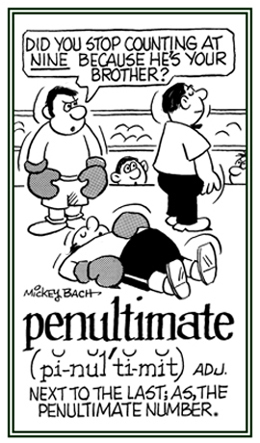ultim- +
(Latin: end, last, final)
Said to be the motto of the Canadian Space Agency.
2. Etymology: a shortened term for penultima, from Latin paenultima, feminine of paenultimus, "next to last" from paene, "almost" + ultimus, "last".
2. Etymology: from Latin paene, "almost" and ultimus, "last".

Go to this Word A Day Revisited Index
so you can see more of Mickey Bach's cartoons.
These words are inscribed on some clocks to indicate that the moment of death; indeed, the moment of eternal judgment, may be at hand. The wise person treats every hour as though it were his/her last.
2. The final sanction; the last argument; the last resort; the means last to be resorted to.
The final argument of kings. Louis XIV of France, recognized that force is the final argument, so he directed that his cannons carry the engraving ultima ratio regum (1650). As a result, this phrase usually signifies "war" or "the use of military weapons as a force". The phrase was adopted in the form of Ultima ratio regis for the same purpose which appears on cannon cast for Frederick the Great after 1742.
2. The "end of the world" or to the "final edge" of the earth.
Ancient Greek mariners believed that the northern end of the world was an island called Thule, said to be six days' sailing distance from Britain.
The precise location of Thule is not known today, but ultima Thule, mentioned in Virgil's Georgics, survives as a useful expression for describing any place whose appearance gives one the feeling of standing at the end of the world. Maybe it was one of the Shetland Islands.
It may be of interest to note that the current list of Chemical Elements has an element named for this unknown "end of the world": thulium; symbol, Tm; atomic number, 69; which was discovered by Per Teodor Cleve in 1879.
The end of the world. Ancient Greek mariners believed that the northern end of the world was an island called Thule, said to be six days' sailing distance from Britain. The precise location of Thule is not known today, but ultima Thule, mentioned in Virgil's Georgics, survives as a useful expression for describing any place whose appearance gives one the feeling of standing at the end of the world perhaps one of the Shetland Islands.
Figuratively it refers to any distant frontier or remote goal. It may be of interest to note that the current list of Chemical Elements is named for this unknown "end of the world": thulium; symbol, Tm; atomic number, 69; which was discovered and named by Per Teodor Cleve in 1879.
Also, Supremum vale or "Farewell for the last time"; that is, just before death takes over.
Mrs. Thompson was experiencing the ultimacy in sorrow and despair after losing her husband, children, house, and all of her belongings in the terrible war.

